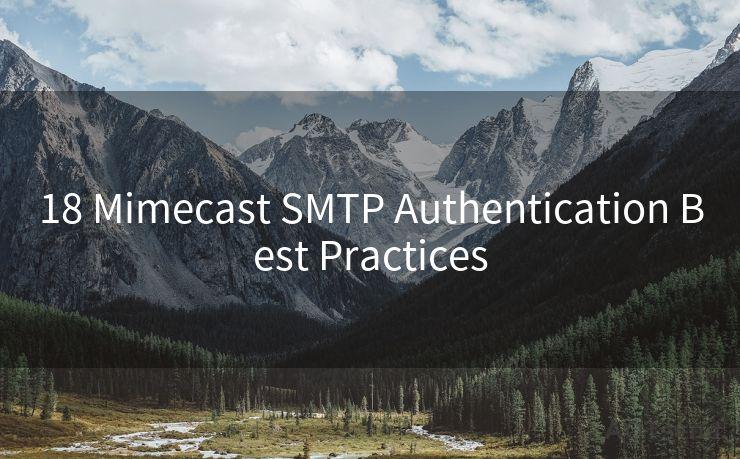18 Mimecast SMTP Authentication Best Practices




When it comes to email security, SMTP authentication plays a crucial role. Mimecast, as a leading email security provider, offers robust solutions to protect against email-based threats. In this blog post, we'll explore the 18 best practices for Mimecast SMTP authentication to ensure secure and reliable email communications.
1. Enable SMTP Authentication
The first and foremost best practice is to enable SMTP authentication on your Mimecast system. This ensures that only authorized users can send emails through your server, reducing the risk of spam and phishing attacks.
2. Use Strong Passwords
Require strong and unique passwords for SMTP authentication. This significantly reduces the chances of brute-force or dictionary attacks succeeding.
3. Implement Multi-Factor Authentication
For added security, consider implementing multi-factor authentication (MFA) for SMTP access. MFA requires an additional verification step, such as a one-time password or a biometric factor, making it harder for unauthorized access.
4. Regularly Update Credentials
Regularly updating SMTP credentials reduces the risk of compromised accounts being used for malicious activities. Encourage users to change their passwords periodically.
5. Monitor and Limit Login Attempts
Monitor SMTP login attempts and limit the number of retries allowed. This helps mitigate brute-force attacks and locks out potential attackers after a certain number of failed attempts.
6. Utilize Secure Connection Protocols
Ensure that all SMTP connections use secure protocols like SSL/TLS. This encrypts the data in transit, protecting it from eavesdropping and tampering.
7. Implement DMARC, DKIM, and SPF
Adopting email authentication protocols like DMARC (Domain-based Message Authentication, Reporting, and Conformance), DKIM (DomainKeys Identified Mail), and SPF (Sender Policy Framework) can help validate the authenticity of emails and reduce spoofing attacks.

8. Regular Security Audits
Conduct regular security audits to identify and address any vulnerabilities in your SMTP authentication system.
9. Train Employees on Security Best Practices
Provide regular training to employees on email security best practices, including the importance of protecting their SMTP credentials.
10. Restrict Access to Sensitive Data
Ensure that only authorized personnel have access to sensitive data transmitted via SMTP. Implement role-based access controls to manage permissions effectively.
11. Use a Firewall
Deploy a firewall to protect your SMTP server from unauthorized access and potential attacks.
12. Keep Software Updated
Regularly update your Mimecast and other relevant software to the latest versions to patch any known vulnerabilities.
13. Implement Intrusion Detection/Prevention Systems
IDS/IPS can help detect and prevent malicious activities targeting your SMTP server.
14. Monitor Email Traffic Patterns
Regularly monitor email traffic patterns to identify any suspicious or unusual activities that may indicate a security breach.
15. Implement Email Filtering Rules
Set up robust email filtering rules to block spam and phishing emails before they reach users' inboxes.
16. Have an Incident Response Plan
Prepare an incident response plan to quickly and effectively respond to any potential security breaches involving your SMTP server.
17. Backup Data Regularly
Regularly backup all important data to ensure business continuity in case of any security incident or system failure.
18. Conduct Regular Penetration Testing
Penetration testing helps identify vulnerabilities in your SMTP authentication system before attackers can exploit them.
🔔🔔🔔
【AOTsend Email API】:AOTsend is a Managed Email Service for sending transactional emails. Support Email Types: reminders, authentication, confirmations, notifications, verification codes, invoices, password resets, account activations, billing statements, two-factor authentication (2FA), and one-time passwords (OTP) emails, etc. $0.28 per 1000 Emails. 99% Delivery, 98% Inbox Rate.
You might be interested in:
Why did we start the AOTsend project, Brand Story?
What is a Managed Email API, How it Works?
Best 25+ Email Marketing Platforms (Authority,Keywords&Traffic Comparison)
Best 24+ Email Marketing Service (Price, Pros&Cons Comparison)
Email APIs vs SMTP: How they Works, Any Difference?
By following these 18 Mimecast SMTP Authentication Best Practices, organizations can significantly enhance their email security posture and reduce the risks associated with email-based threats. Remember, security is an ongoing process, and it's essential to stay vigilant and proactive in protecting your systems and data.




Scan the QR code to access on your mobile device.
Copyright notice: This article is published by AotSend. Reproduction requires attribution.
Article Link:https://www.mailwot.com/p6470.html



